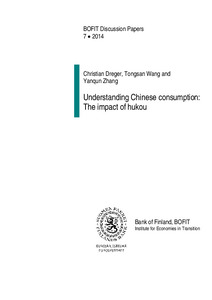Understanding Chinese consumption: : The impact of hukou
Dreger, Christian; Wang, Tongsan; Zhang, Yanqun (04.03.2014)
Numero
7/2014Julkaisija
Bank of Finland
2014
Julkaisun pysyvä osoite on
https://urn.fi/URN:NBN:fi:bof-201408072216Tiivistelmä
Capital investment and exports have driven China's remarkable economic growth for decades, but recent trends have put pressure on the government to move to a more consumption- driven model of growth. Unfortunately, China's institutional framework does little at the moment to spur household consumption. While the country's weak social security setup and highly regulated financial markets are routinely cited as disincentives to private consumption, the role of the hukou household registration system in depressing consumption gets less attention. Controlling for income levels on datasets from 2002 and 2007, we show the average propensity to consume is significantly lower for internal migrants to cities. Official figures suggest that China in 2013 had about 260 million internal migrants. These individuals are often separated from their families for long periods and denied access to public services in the cities where they work. The government's current urbanization strategy calls for increasing migrant populations in cities, which, in the absence of hukou reform, is likely to further dampen consumption. Keywords: Chinese private consumption, urbanization strategy, hukou system JEL: E21, O15, R23
Julkaisuhuomautus
Published in Development and Change, Volume 46, Issue 6, November 2015, Pages 1331-1344
